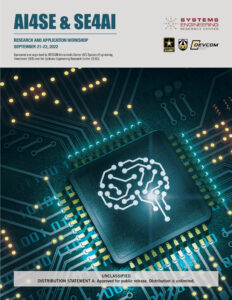Published Report Shows Opportunities and Advances in Co-evolution of AI and SE
The US Army DEVCOM Armaments Center (AC) Systems Engineering Directorate (SED) and the Systems Engineering Research Center (SERC), a University Affiliated Research Center (UARC) for the Department of Defense (DoD), jointly sponsored the third Artificial Intelligence for Systems Engineering & Systems Engineering for Artificial Intelligence (AI4SE & SE4AI) Workshop on September 20-21, 2022. The two-day hybrid event—held in person at Stevens Institute of Technology, Hoboken, NJ, and online at ZoomGov—gathered participants from government, academia and industry to learn from leaders using AI in this space, share ideas and advance outcomes that resulted from previous AI4SE/SE4AI meetings.
This year’s workshop highlighted the role of data in developing the AI– and ML (machine learning)–enabled tools that allow everyone, from the systems engineer to the warfighter, to do things they could not accomplish previously. While AI and automation can support productivity, efficiency, and decision making, it is ultimately people who develop and adopt these tools and people need training to understand their role within the larger, interconnected digital ecosystem. Increasingly, systems engineers need to get ahead of the problems to be solved and the opportunities to be harnessed.
A summary report provides an overview of the 17 presentations, two panels and various discussion sessions conducted over the two-day event and focused on topics within the areas of Artificial Intelligence for Systems Engineering (AI4SE), Systems Engineering for Artificial Intelligence (SE4AI), AI4SE and Development (DEV), and SE4AI and Verification and Validation (V&V). An important thread throughout was the need for organizations and systems to be agile and keep pace with the dynamic nature of AI in order to deliver the most relevant tools to the operator in the field. Areas identified as essential in prior meetings maintained a high level of significance this year, notably the role of system reliability in building user confidence and the need to update business processes, particularly workforce development and retention. Discussions consistently highlighted the importance of data, particularly its acquisition, analysis, maintenance, reliability, and security; its role in human and machine learning (ML); and its role in the testing and validation of AI-enabled systems to mitigate risks and build trust.
The previous years’ workshops guided this year’s presentations, panels and discussions, during which the following themes evolved:
- The topic [AI4SE & SE4AI] and associated endeavors are complex: Each of the 2022 workshop’s four tracks explored the complexity of human-machine teaming and the associated endeavor undertaken by systems engineering (SE) and considered how AI can augment SE processes, what SE can do to address the limitations of AI, and the challenges that AI presents to the SE discipline. V&V and testing and evaluation (T&E) of new systems need to continue evolving to understand the tests being used and the future use of the systems.
- AI is a system: Mitigating the uncertainty of AI and providing guardrails against emergent events is a task to be shared by designers and systems engineers and needs to start from system design, based on mission and operator requirements. AI provides the benefit of automating certain processes and creating critical feedback loops—including from the operator in the field—and allows for systems to be shaped to compensate for the limitations of the AI. Powerful tools are currently available, such as the One Semi-Automated Forces (OneSAF) simulator and the Tactical Ammunition Management Micro Services (TAMMS), and more are being developed to address the needs of the SE community and the end users of AI enhanced systems.
- There are opportunities and challenges as AI4SE and SE4AI come together: Digital twins continue to be indispensable tools as a digital representation of a physical asset allows for real-time learning and testing that enhance system refinement and maintenance and build critical stakeholder trust in the system, particularly among users and operators.
- Expanded thinking around training is critical: Training, both for the operators and the developers of systems with AI, must continue to be a focus. New AI capabilities, enabled and enhanced by validated and actionable data, can train the warfighters who will use the next generation of systems and those who create the tools. Hands-on, interdisciplinary training that helps individuals understand their role within the digital ecosystem and the role of AI within their context can help the US keep pace with global players.
- Navigate cultural and policy roadblocks: AI-based applications will continue to permeate future SE and acquisition practices. AI applications are fundamentally digital and will evolve with the digital transformation of government policy and practice. Services will have to share data and reconsider their siloed cultures and business processes. The Acquisition Innovation Research Center (AIRC) continues to research policies related to new technologies and whether they drive or inhibit progress.
More powerful computing and an increase in data will continue to drive the proliferation of AI. Unprecedented technology generates uncertainty, and loss of trust in new technologies and systems can slow progress. Safety is a primary concern, with the greatest risk passed on to the warfighter. The mix of industry, academia and government represented at the annual workshops is where innovative solutions lie to the evolving challenges that accompany advancements and change. The workshop organizers and participants look forward to a fourth event in 2023.
Detailed information on the event’s keynote, presentations and panels can be viewed here.



